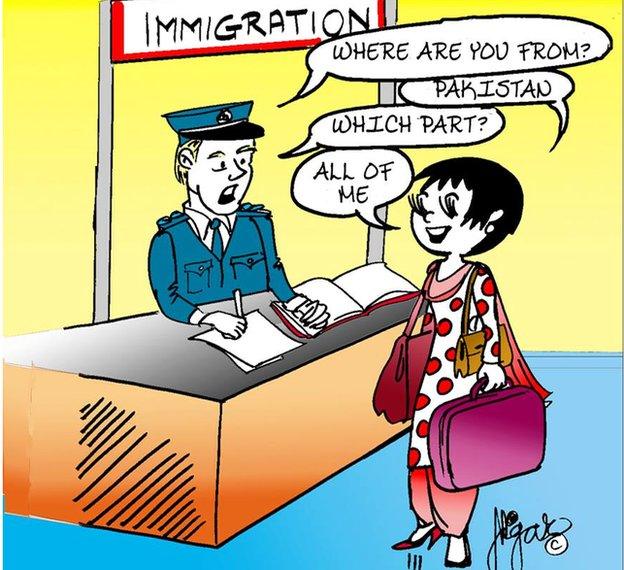Gogi, the heroine created by Pakistan's first female cartoonist
- Published

Gogi, with her signature polka dot outfits, is beloved by many in Pakistan
Pakistan's first female professional cartoonist, Nigar Nazar, nearly ended up becoming a doctor.
"In college I was studying to become a doctor, but I was constantly doodling in the margins of my medical books," she says.
"Shortly afterwards I decided to take a U-turn and managed to persuade my parents to let me take fine arts."
The decision paid off.
The star of Nazar's comics, Gogi, is a progressive, educated Pakistani woman who wears polka-dotted dresses - and is loved by thousands around the world.
One of her favourite cartoons explores how many in Pakistan prefer having sons to daughters.
"In our country a girl's birth isn't celebrated very much and I really hate that," Nazar says.
She focuses on social issues and contradictions in society, saying: "I get inspiration from things that happen around me."
The Gogi comics have messages about women's education and the environment - but also depict the humorous side of everyday life in Pakistan.
Nazar says she began reading comic books as a child in the US: "It really began when my father was on a posting in Washington.
"When we returned to Pakistan, unable to find any local comic books, I stuck to the comics I used to read in the US and frequented the local bookshop to borrow, exchange or buy comics."
Nigar Nazar's comics frequently explore the need for women's education
After she dropped her pre-medical degree to pursue her love of drawing, she won a scholarship for art.
However, she says: "It was a struggle because there was no training offered in comic art.
"I joined an art institute but I had no formal classes, I was just told to draw a cartoon everyday."
"I borrowed some 'teach yourself' books on cartooning and while that kept me going for some months, the real work began when I got a job with a daily newspaper."
Although Gogi is beloved by many in Pakistan, Nazar says her strip is not often published in local newspapers because comics about social issues are "not as popular as political cartoons".
"I've tried to turn my attention to social media now, and instead of newspapers, I've made awareness raising comic books," she says.
"I've made 14 comic books on a range of issues like extremism and corruption, girls' education and women's rights."
Pakistan ranks 147 out of 180 countries for press freedom, according to the Reporters Without Borders index.
Nazar admits that she sometimes has to self-censor: "In a way there's a lot of freedom of speech in Pakistan but it's only limited to certain topics that don't address some of the more real issues that affect people.
"Tolerating freedom of speech will only happen in it's truest sense when people's mindsets also change."
However, she also believes that comics offer a unique way for people to express themselves.
"I stay away from religion-related topics but it's not like I haven't addressed any taboos at all," she says.
"In some cases I've used quotations from the Holy Koran and got approval from clergies to support my cartoons on education as a basic right for girls and anti-sexual harassment cartoons.
"I think you can get away with saying a lot through cartoons that you can't say in any other way."
- Published3 November 2015
- Published4 October 2015
- Published9 July 2015